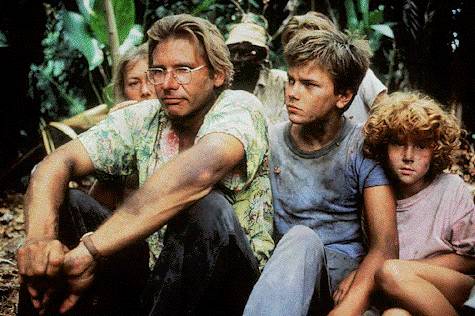This was a refreshing role to see Harrison Ford play. I feel like one of the common criticisms expressed, regarding Ford's abilities as an actor, is the idea that he is able to play only a certain archetype. This common idea of Ford as a rougish hero abounding with acidic remarks is challenged in Mosquito Coast. As Pfiffer remarks, his character, Allie Fox, is "a good father and a bad father. He’s a monster, a clown, a fool, a genius” (157). Throughout the film, Allie Fox descends further and further into the depths of fanaticism and insanity.
In the first act, Allie's fanaticism is displayed in his initial tirade to his young son, Charlie. In this long, critical speech, he deplores American consumerism and, subsequently, the American dream. He makes his first fanatic prediction of a nuclear war caused by American greed and crime. Throughout the film, Allie is constantly spouting his beliefs about the negligence, and selfish desire of American capitalism. He believes American has descended into a cesspool of commercialization, partly caused by the undermining of American product. Allie believes that American companies' proclivity to endorse foreign products has led to fewer job opportunities for the American worker, leading to the ultimate decline of America. He acts upon his dissension with the American dream when he goes to a hardware store and refuses to purchase the product when he learns that it was made in Japan. He instead treks to a garbage dump to acquire the materials himself, rather than deviating from what he thinks is the "American way." His temper tantrum at the store demonstrates his growing fanatical reasonings and his fixed belief that he is the only one who knows what is going on.
In the second act Allie is happily continuing on his rants concerning American tyranny. He has found an even bigger, more receptive audience in the limited-English speaking natives of Mosquito Coast. Throughout this act, Allie is seen transcending deeper and deeper into his own illusions and delusions. He endeavors to create a utopia for himself and his family but uses his family and the native people as slaves to create his own ideas and desires.
I think the beginnings of his descent into true fanaticism is shown after he constructs his massive, towering ice machine, "Fat Boy." Allie is initially proud of his accomplishment, but after things seem to be working out too well he decides that he has to take on a new challenge. He sees himself as the savior and bringer of civilization to these "savage" peoples and reiterates constantly that the foundation of civilization is ice. After hearing about native people up in the hills who have had limited contact with outsiders, Allie embarks upon a mission to bring these people his new creation. The entire journey up the hill, he verbally abuses his own sons and throws a fit when it turns out that the ice has melted (no surprise in the jungle heat). He can not deal with the idea that he may be wrong in his ideas or that anyone elses thoughts may be relevant. Classic fanaticism.
In act three, the man reaches his pinnacle of "straight crazy." His family is on the edge of starvation, they have been floating down the river on a raft, in pursuit of whatever crockpot scheme he has cooked up next. They think they have found their salvation when they reach a settlement, but these hopes are quickly dashed when it turns out to be Allies' archenemy, the missionary. Despite his family's obvious suffering he refuses to ask for aid, instead sneaking into the church late at night and burning it down as 'revenge' for some personal grievance known only to him.


No comments:
Post a Comment